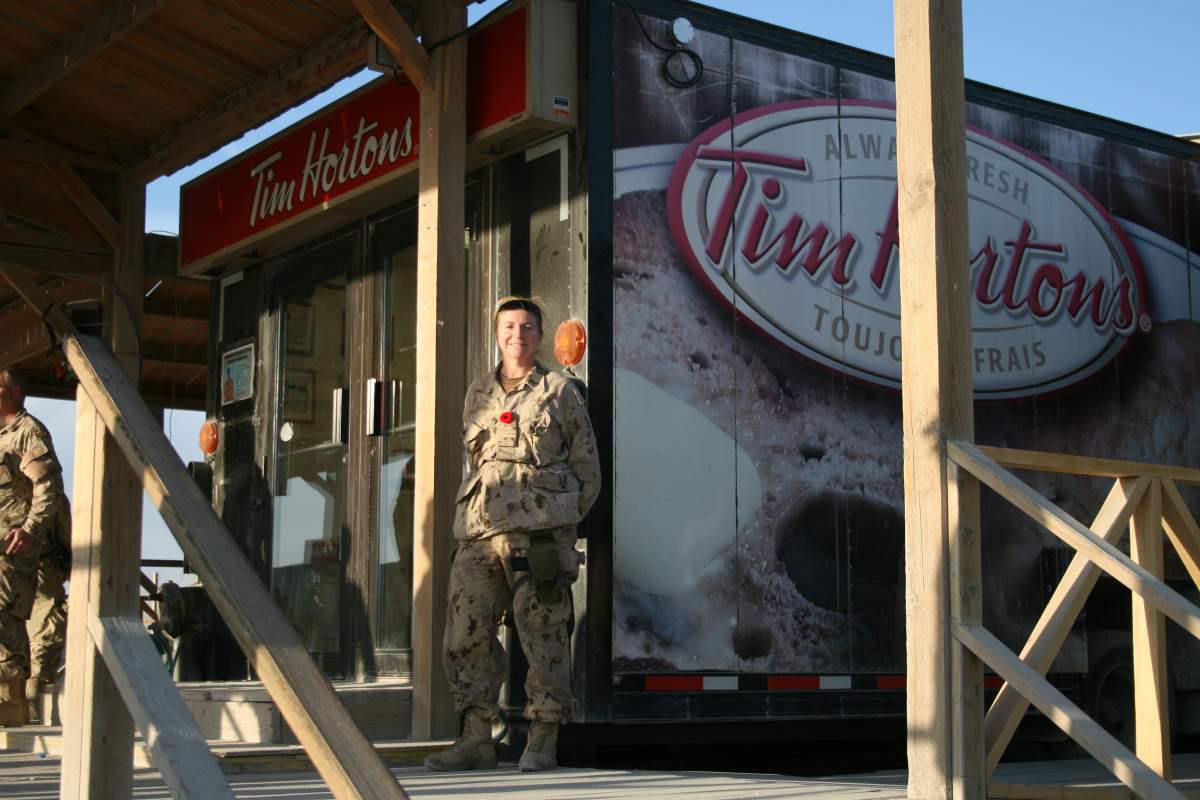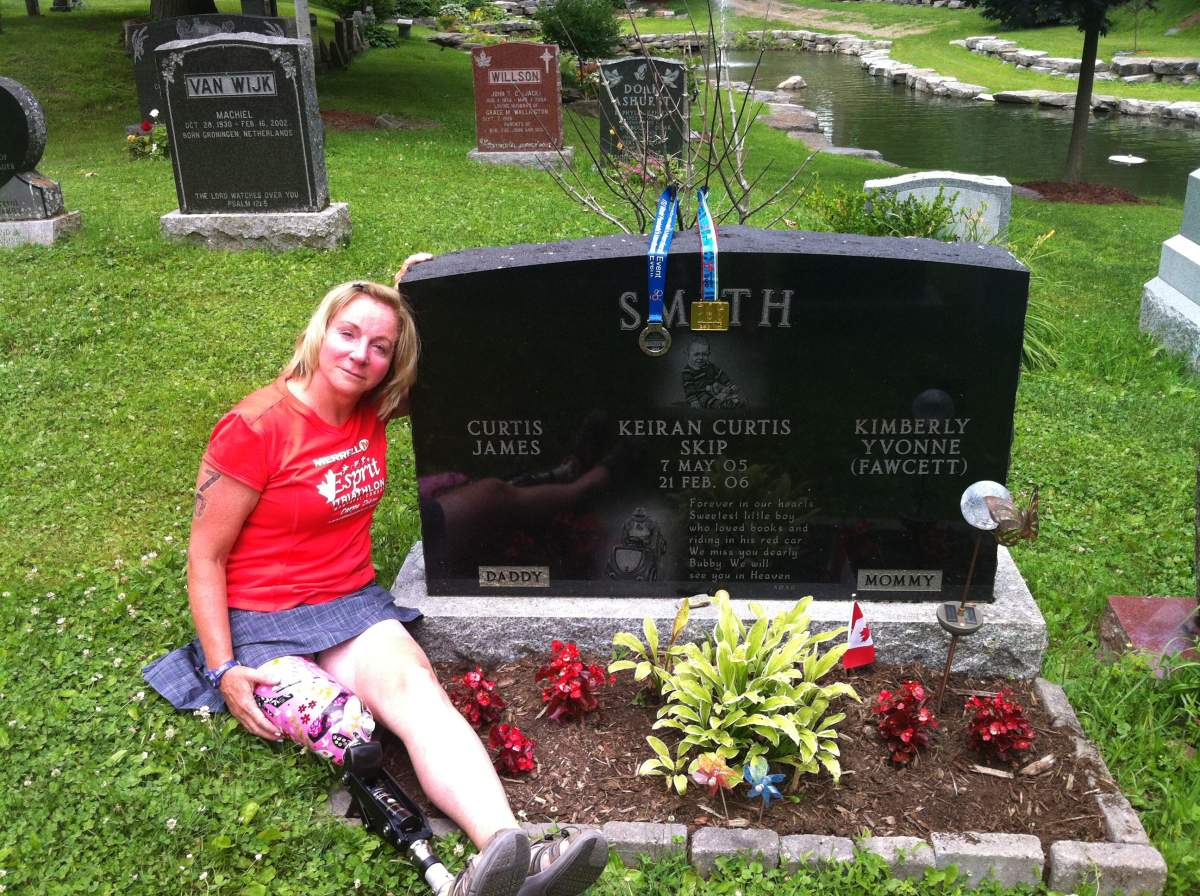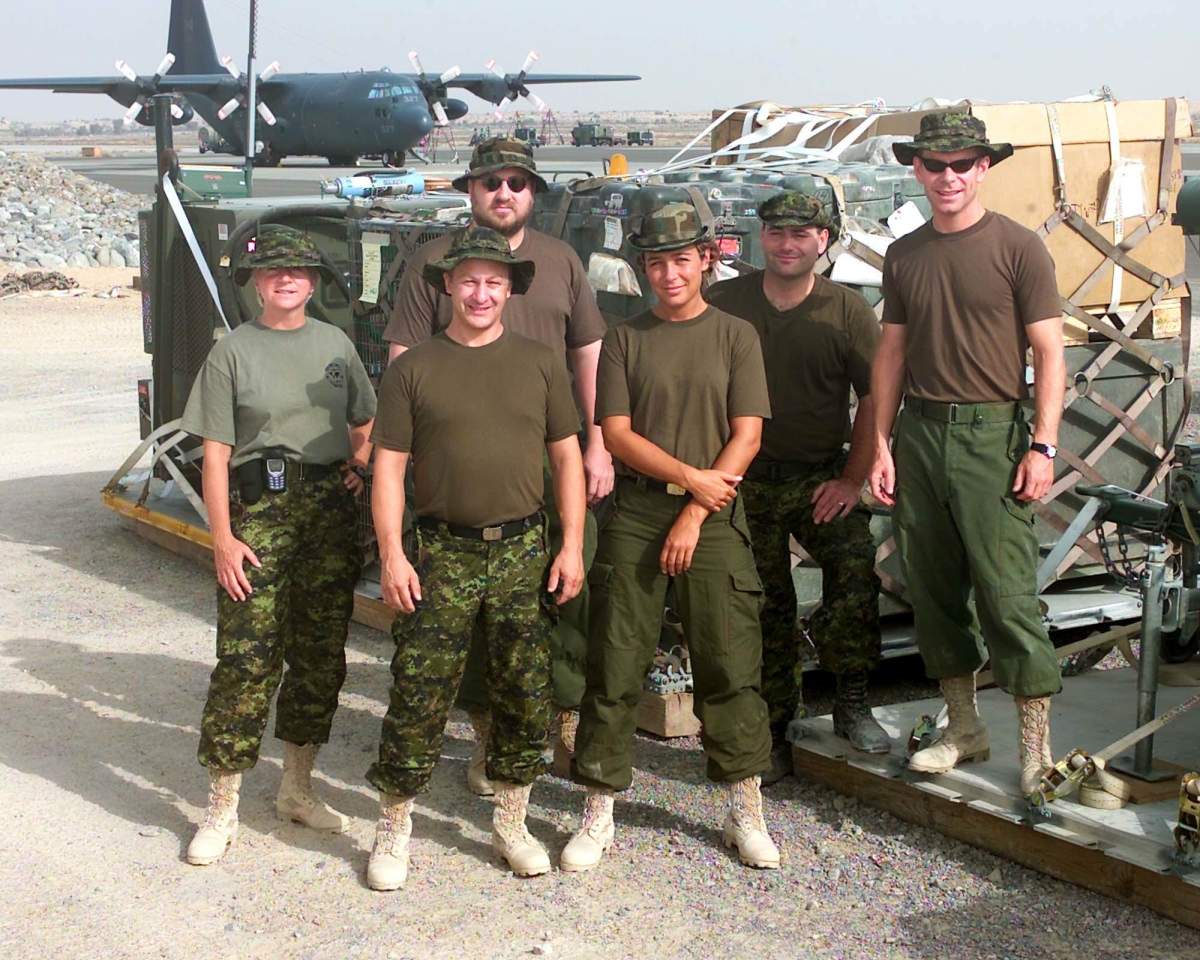UPDATE: Dec. 13, 10:30 a.m.

Late on Dec. 12, officials from the Canadian Armed Forces told Global News they are willing to immediately sit down with Captain Kimberly Fawcett and examine any outstanding costs for her prosthetic. Defence Minister Harjit Sajjan also says he is looking into the file and the military adds Fawcett is receiving support through multiple military programs. Also, since Global News posted Fawcett’s story, a veteran’s charity has stepped up and is offering to pay some of her bills to alleviate the financial strain.
Air Force Capt. Kimberly Fawcett served her country, deploying twice to Afghanistan as a part of Canada’s war effort.
Now Fawcett is fighting her own government, asking the military to pay for a prosthetic limb, after she lost her leg in an accident that wounded her critically and killed her nine-month-old son, Keiran.
The roads were slick with ice the morning of Fawcett’s accident, not ideal conditions, but she needed to take her infant son to someone who could look after him if she had to deploy suddenly.
Both Fawcett and her husband were members of high readiness units in the Canadian Armed Forces, meaning they could be deployed overseas on short notice and at the same time.
- Canadian immigration officers investigating hundreds identified by extortion task force
- Carney unveils ‘Buy Canadian’ defence plan, says security can’t be a ‘hostage’
- Inflation cooled to 2.3% in January but food prices up again: StatCan
- Ottawa expects Ukrainian emergency visa holders to return after war ends

The possibility of a sudden simultaneous deployment of both mom and dad meant the Canadian Armed Forces required the couple to devise a plan to make sure baby Keiran would always have child care, known as the Family Care Plan.
On the morning of Feb. 21, 2006, it looked like a double deployment could be in the works. Fawcett’s husband Curtis was called to the base for workup training to deploy to Africa and her unit was next in line for activation.
Fawcett executed the Family Care Plan with the approval of her commanding officer, donning her uniform and putting her son in the car to drop him at his grandparents’ house.
That’s when things went horribly wrong.
Coverage of veterans on Globalnews.ca:
Fawcett merged onto the busy 401 highway near Kingston, but almost immediately lost control of her vehicle on the icy road, sliding across traffic and slamming into the median.
Fawcett immediately realized she and Keiran were in serious danger — her vehicle was partially blocking the passing lane.
Her military training kicked in and Fawcett quickly formed a plan: she would take Keiran and head for the safety of the ditch.
WATCH: Quilts of Valour for Canadian Armed Forces

It never occurred to Fawcett these would be her final moments with her son. She unstrapped the baby from his car seat and tried to reassure him.
“My last memory, as sad as it is, is I had kissed my little boy on the cheek and said don’t worry Keiran, mommy loves him. And waited for him to smile, and make sure that you know he knew everything was A-OK and he was safe, ” Fawcett said.
Fawcett clambered into the ditch with Keiran in her arms. That’s when tragedy struck.
A speeding truck clipped a semi, lost control and plunged into the ditch, hitting Fawcett and her son.
The truck clipped the side of Fawcett’s leg, snagging her uniform and setting off a horrific chain of events.
“He clipped me at the side of my leg, and the button to my combat pant got caught in the grill of the vehicle and I had Keiran in my arms,” she said.
Fawcett was dragged under the wheels of the truck and her leg was torn off at the hip.
Keiran was ejected from his mother’s arms and into the path of an 18-wheeler truck. He was killed instantly.

Get breaking National news
“He’s our only child, so it was a very difficult loss for us,” an emotional Fawcett explained.
When Fawcett woke up in the ICU after being in a coma, hospital staff and the military padre made special arrangements to have Keiran brought to his mother’s bedside in his casket for a final goodbye.
WATCH: Pressing veterans affairs minister on access to treatment for vets

“They opened the casket so I was able to touch his hand. But I don’t think I really comprehended that he was gone because his hand was cold,” she said.
“I touched his hand and I just looked at the padre and I said to him ‘padre, he needs a blanket… because he’s cold. I just still didn’t fathom that he had gone away and he wasn’t coming back. It was like he was still sleeping.”
Fawcett decided to continue to serve in the military despite the staggering tragedy. She learned to walk again and returned to work.
She competed in the Invictus Games and in numerous para sports events, such as running, biking and swimming.
In each event, she had a secret pocket sewn into her racing suits so she could carry a picture of Keiran over her heart. Fawcett still takes each medal she wins and hangs it on Keiran’s grave to share it with him.
Fawcett’s strength and courage grew with each day. She decided she wanted to return to Afghanistan on active duty.
Against all odds, Capt. Fawcett became the only Canadian woman to deploy to Afghanistan with a prosthetic limb. She served during the height of the Afghanistan war in Kandahar, helping the families of fallen soldiers to process their own losses on bereavement visits.
Despite her dedicated service, Fawcett said she has been betrayed by the very institution and government she has served faithfully.
Prosthetics are expensive, but the Canadian Armed Forces is refusing to pay for Fawcett’s prosthetic leg, disputing whether she was on duty at the time of the accident.
That has left Fawcett on the hook for the cost.
WATCH: Monument unveiled in Kirkland in support of veterans, returning soldiers

In February, Fawcett received an envelope marked “FINAL.”
Inside was a bill for $34,151.15 from the makers of her prosthetic leg.
“I’m the one that’s opening the bill for $30,000 and expected to pay for it out of my own pocket,” a frustrated Fawcett explained.

The military bureaucracy has spent nearly 10 years fighting over whether or not Fawcett was “on duty” at the time of her accident and therefore whether the military has a responsibility to pay for her prosthetic.
Basically, the military has been fighting over whether Fawcett was acting as a mom or a soldier that day.
“It’s been 10 years of absolute hell,” Fawcett said of her experience fighting the Canadian Armed Forces.
Documents obtained by Global News show that the military initially concluded Fawcett was on duty.
A summary investigation ordered by the military found that, although Fawcett was not at her place of duty at the time of the accident, she was “’going about a matter related (directly) to service in the Canadian Forces’ (Ref E para 29) in that both travel to her son’s daycare and then to the base were required activities to enable her to perform her military duties at work.”
The investigating officer continued that Fawcett “… should be considered on duty from the time she left home in uniform, as her activities were all in support of carrying out her military duties.”
That finding was overturned by one of Fawcett’s commanding officers who determined she was not on duty despite the findings of the summary investigation.
The military has repeatedly argued that the Family Care Plan is a policy but not an order and therefore following it does not mean a troop is on duty, Fawcett said.
That position was directly disputed in a review by one of Canada’s top generals at the time, Major General Walter Semianiw who was the Chief of Military Personnel. In a review Major General Semianiw determining Fawcett was on duty and following military orders at the time of her accident, concluding “The execution of the Family Care Plan, is in fact, a military order.”
Still, the military refused to pay for Fawcett’s prosthetic limb, quibbling with the definition of what the term “on duty” means. The Canadian Armed Forces has argued that Fawcett was fulfilling personal obligations, not military duties, at the time of the accident.
Fawcett took her case to the Federal Court for review.
WATCH: Justin Trudeau on the support of military veterans, first responders

A judge found the military was being unreasonable in denying her benefits and ordered a re-evaluation. The military refused to pay and appealed, and the subsequent judge found in the Canadian Armed Forces’ favour. Fawcett is currently appealing that decision.
Fawcett said the military bureaucracy is contradicting itself and splitting hairs to avoid honouring its commitment to injured troops.
“You have a duty, you have a responsibility. This is what the policy says. Don’t turn around and say they don’t apply or they only partially apply,” Fawcett argued.
“It was coming down to points of semantics. It wasn’t points of honour, duty, loyalty, it was like all of that was thrown out the window,” a disappointment for Fawcett and her husband who joined the military out of those shared values.
In November, Fawcett’s last ray of hope that the government would willingly pay for her prosthetic limb was dashed. In a letter Veterans Affairs Canada wrote because the military found “you were not on duty at the time of the accident and the injuries you sustained were not attributable to military service,” Fawcett was not eligible for a disability award.
After a decade of fighting, Fawcett is fed-up but not giving up, “This cost my spouse and I our lives and the life of our son, serving our country and damn it I’m going to fight and I’m going to fight tooth and nail.”
It is extremely rare for a serving member of the military to sit down in front of a camera and tell their story, but Fawcett said she feels she has no other choice.
“I did what you hope that no soldier would ever have to do and that would be go public with their story to say, OK, I want justice now,” she said.
WATCH: Trudeau responds to emotional military veteran’s concerns on government aid

Fawcett wondered why the government wouldn’t help her after she saw the headlines showing that Omar Khadr received a $10-million dollar payout from the federal government.
Then came the news that Christopher Garnier, the man convicted of killing Halifax police officer Const. Catherine Campbell, was receiving PTSD treatment paid for by Veterans Affairs despite having never served a day in uniform.
Fawcett was outraged.
“They bent over backward to be nice to Omar Khadr. To do the right thing even though it wasn’t popular, and then I kinda think… well, I didn’t murder anybody. I didn’t go against my country. I simply served, so why am I being singled out?”
Part of the problem stems from what Fawcett alleged are sexist attitudes in the military about women serving, relegating what would be on-duty status for a man, to mom duty status for a woman, “There is a cadre, there is a bureaucracy, there is group of the old boys club that still exists when it comes to women, it’s fake and phony. They say one thing but in actual fact they do the exact opposite.”
Fawcett said she had shocking conversations with senior military officers who told her “only men are heroes and that women, well we’re disposable.”
It is an attitude Fawcett wants stamped out because she said it contributes to a systemic bias against injured female troops.
She hopes the self-proclaimed feminist Liberal government will change that.
“I’m hoping that our good prime minister is going to be true to his word that when he says there’s an issue with inequity with regards to gender he’s going to step in and make a decision.”
Fawcett is also calling on Defence Minister Harjit Sajjan to act to ensure equality for women in the Forces.
“When it’s an issue in terms of fairness toward an ill and injured solider that again, the minister of national defence is going to stand up and say we’re going to create equity where there is inequity,” she said.
Fawcett said it’s time for the military’s attitude toward injured female troops to change.
“We fight for this country just as hard as any man,” she said.
Former minister of veterans affairs Erin O’Toole is calling on the minister’s office to help Fawcett.
“She lived up to her commitment to the Canadian Armed Forces and the Liberal government is not living up to their commitment to ensure that she has prosthetics and the proper care she needs,” he said.
“This is the worst-case scenario you ever hear… it’s another example of a government that’s out of touch and here a family is caught in the cross fire.”
Global News reached out to the defence minister’s office for comment but has not received a response.
















Comments
Want to discuss? Please read our Commenting Policy first.